- MOCPED 3RD CONVOCATION LECTURE
MOCPED| 3rd Convocation Lecture - INTRODUCTION
One of the accepted truths in education is that the quality of education depends largely upon the quality of the teachers. Whatever input is made into an educational system in respect of management, resources, facilities and array of instructional materials will produce little result if the teachers are unskilled, poorly trained or even ignorant. In developing countries such as Nigeria where computer-based programmed instruction is not yet common, teachers are livewire of the education process. The success of any educational enterprise particularly in terms of quality depends to a large extent on the regular supply of adequate number of good quality teachers.
Teachers are crucial inputs of an educational system and no educational system can rise above the quality of its teachers. The many specialties in teaching today, with their wide range of required skills and knowledge mean that teachers need to be well prepared to a degree for the vastly different nature of teaching functions, challenges and tasks therein. This points to the fact that for effectiveness, teachers need to be given a professional education that will qualify them thus, as well as enable them to effectively perform the task of giving the appropriate support towards enhancing a virile and qualitative system of education in any nation. Teacher education is therefore the foundation of quality in the educational system and this is the key to unlock all facets of development, be it social, economic, political, religious or cultural.
According to Akinwunmi (2004) for any teacher education to be successful, some salient issues must be addressed in relation to quality in teacher production, selection of entrance into the profession, teacher preparation programme and administrative leadership among others. Presently, many problems confront teacher education in Nigeria which need to be addressed if the system is to be effective and efficient. These include aversion for the teaching profession, low teacher retention and high turnover, inadequate quantity and quality of teachers, among others. These issues arose from the present arrangement of the teacher education system which is neither effective nor efficient. For the problems to be redressed therefore, there is the need to ensure that the system is overhauled and redesigned to ensure both effective and efficient delivery of quality teacher education.
It is in the light of the above that this paper attempts to proffer radical suggestions with regard to the institutional arrangement for the production and development of teachers in Nigeria to facilitate and guarantee the improvement of the country’s overall quality of education via the uplifting of the teacher education system.While many aspects of the problems hindering the effectiveness of the teacher education system has been discussed by several authors, virtually non has paid attention to the improvement of the institutional aspects of the problem. This, I hope to do in this paper. The Colleges of Education shall be the pivot of our discussion because they constitute the greater bulk of the teaching system. As Filani (2010) noted, NCE teachers (who are products of Colleges of Education) form about 75% of teachers in Nigeria. It therefore stands to reason that any radical restructuring of the system will have to be hinged on this segment of the teacher education system.
- AN APPRAISSAL OF THE KEY CONCEPTS
There are three key concepts in our topic, the understanding of which facilitates proper understanding of the ideas that we are about to put forth. These concepts are: redesigning; teacher education; effectiveness and efficiency.
Redesigning: The first of this is redesigning.A survey of the dictionary shows that there are several interpretations of the word design. It could mean among other things:
- a specification, plan, or outline from which something may be made
- the general arrangement or planning of something
- To design how something will look or work especially by making plans, drawings or models of it
- To think of or plan a system or procedure
To design something therefore is to prepare a plan, specification, roadmap or outline of how the thing will be. The word redesign is a derivative of the word design and it implies:
- to design again;
- to design in a new way;
- to reorganise, and
- to revise
something in appearance, function or content.
From the above therefore, it should be clear that an attempt to redesign something such as an education system might involve radical revision, reorganisation or re – arrangement of the existing pattern of order concerning such a system. This is what I hope to achieve in this lecture.
Ordinarily, the desire to redesign something pre-supposes that that thing is faulty and hence is unable or incapable of achieving desired goals or achieving it in an efficient manner. A perfectlyor well functioning system may not needto be redesigned as doing so serves no useful purpose.However, a non- functioning or faulty system needs be redesigned to remove the rigidities or imperfections that are hampering the effective functioning of the system and thus improve its performance.
Teacher Education: teacher education is the training that teachers or potential teachers receive either for them to be classified as professional teachers or for them to improve their professionalism as teachers.Okafor (1988) defined teacher education as the form of education which is planned and systematically tailored and applied for the cultivation of those who teach or will teach particularly but not exclusively, in primary and post primary levels of schooling.Teachers’ education is the process which nurtures prospective teachers and updates qualified teachers’ knowledge and skills in the form of continuous professional development. It revolves around the policies and procedures designed to equip prospective teachers with the knowledge, attitude, behaviour and skills required to perform their duties in the classrooms (Nakpodia and Urien, 2011). According to Ipaye (1996) teacher education is charged with the task of developing knowledge and skills as basis for practice, with preparing personnel entry into the teaching profession(pre- service teachers) and with contributing to the ongoing development of practising professionals(in- service teachers).The concern of teacher education world over is the training and preparation of teachers and would-be teachers for effective functioning in the school.
In Nigeria, the objectives of teacher education are clearly highlighted in the National Policy on Education. They include to:
- produce highly motivated, conscientious and efficient classroom teachers for all levels of our educational system;
- encourage further the spirit of enquiry and creativity in teachers;
- help teachers fit into social life of the community and society at large and enhance their commitment to national goals;
- provide teachers with the intellectual and professional background adequate for their assignment and make them adaptable to changing situations; and
- enhance teachers’ commitment to the teaching profession. (FGN, 2013)
The failure of the existing arrangement for teacher education to achieve these objectives will demand a re-organisation or redesigning of the system.
The Effectiveness and Efficiency of an Educational System: Evaluating education policies means expressing a judgement based on a controlled process of investigation regarding the relevance, the advisability and effects of the action that has been taken (Cornalli, 2012). Evaluation addresses two distinct factors: effectiveness andefficiency. Effectiveness concerns an education system’s ability to achieve its goals while efficiency concerns the ability to achieve such goals by making the best use of allocatedresources.
Several indicators have been developed to assess the effectiveness and efficiency of education. Effectiveness indicators refer both to the outputs of education systems in terms of observable products such as graduate outputs from the system and tothe outcomes achieved e.g. performance in examinations. Efficiency indicators are basically economic in nature. They are usually expenditure measures such as public spending on the education system in absolute terms (disaggregated into various units such as public/private, current/capital) or in relation to total government expenditure or the Gross Domestic Product) and expenditure per unit student trained.
In reality, there is no clear cut dichotomy between effectiveness and efficiency and both are usually pursued together in planning educational systems. Though they refer to differenttypes of outcomes, the two goals are always seen as related (Cornalli, 2012).Effectiveness is an essential prerequisite for efficiency, hence an efficient system must necesarily be effective but the converse is not true, not all effective school systems are efficient.Regardless however, the point of emphasis is that for an educational system to be effective and efficient it must enable the achievement of the goals and objectives of the education system and do so at minimal cost.
- HISTORICAL AND EXTANT FRAMEWORK FOR TEACHER EDUCATION IN NIGERIA AND THE DEFICIENCIES THEREIN
Western education started in Nigeria with the coming of the missionaries (the Wesleyan Methodist)to Badagry in the 1842 (Fafunwa, 1974). The history of teacher education in the country however dates back to the late 18th century during the early Christian missionary era (Adesina, 2005). As missionary education metamorphosed into western education, the need to train teachers to take charge of the education process emerged. At that time, teacher education was of the informal type; the teacher being the village catechist chosen and trained by a priest to teach the new converts in the church.
At the initial stage, the missionaries devoted themselves to the development of primary education in the country while the pupil – teacher system was the adopted method of training. Taiwo (1980); Durosaro (2006) and Akintudire (2010) asserted that the first Teacher training College known as The Training Institution was established by the Church Missionary Society (CMS) in 1859 in Abeokuta, western Nigeria (the capital of present day Ogun State). Upon the expulsion of the missionaries from Abeokuta, the institution was moved to Lagos and later Oyo in 1896 as St. Andrew’s College, Oyo. The Baptist Mission founded the Baptist Training College atOgbomoso in 1897, with the Wesleyan Methodist Missionary Society establishing the Wesley College in Ibadan in 1918 for the training of catechists and teachers. In the Eastern part of Nigeria, the Hope Waddell Institute was founded in Calabar in 1892. The training of teachers in the Northern part of the country started in 1909 when the then Colonial Government established the Nassarawa Schools. Katsina and Toro Colleges were later established in 1927 and 1929 respectively.
In this system, the pre – requisite qualification for admission into a teacher training institution was the Standard IV certificate. Students that passed the examination were recruited as pupil – teachers for a period of two years, passed the pupil – teacher’s certificate examination and would then act as assitant teacher before the two year training course. At the end of the two years, the candidate would sit for and passed a prescribed teacher’s certificate examination and would be certified if he passed the examination (Durosaro, 2006;Muktari, 2006; Jekayinfa, 2006).
At this time, the teacher education system was largely haphazard and pretty much unregulated with attendant consequences on the educational outcomes.
Thus, the Phelps – Stokes report of 1925 severely criticised the teacher training system of the missions noting that it was unsatisfactory and inadequate in terms of curriculum and supervision, while it led to the overwork and under payment of the pupil-teachers. Hence, the system was redesigned to redress the perceived inadequacies. This led to the emergence of two types or levels of teacher training institutions each of which lasted for two years; the Elementary Training College for lower primary school teachers and the Higher Elementary Training College for higher primary school teachers.
The Ashby Commission report of 1960 further observed a lot of anomalies in the colonial education in Nigeria, including the Teacher Training system which was seen to be highly inadequate. This resulted in the recommendation for massive expansion of intermediate education for teachers aimed at upgrading the existing teaching force leading to the emergence of Advanced Teachers Colleges (which awards Grade I certificate), and which later metamorphosed into Colleges of Education meant to produce well-qualified non graduate teachers with the Nigeria Certificate in Education (NCE) for secondary schools. The report also suggested the creation of more universities, the institution of a Bachelor degree in Education to award such degrees as the Bachelor of Education (B.Ed), Bachelor of Arts in Education (B.A. Ed) and Bachelor of Science in Education (B.Sc.Ed) and the training of more teachers for the nation’s secondary schools.
In 1969, a National Curriculum Conference was held; the report of which spelt out the objectives and contents of all levels of education, including teacher education in Nigeria. The 1969 Curriculum Conference provided the basis for the National Policy on Education of the Federal Republic of Nigeria (1977) revised in1981, 1998, 2004 and 2013.
The National Policy on Education implementation blueprint specified the types of teacher that were needed to operate the educational system in Nigeria. Six types of teachers, distinguished by their qualifications, were expected to operate the Nigerian educational system. According to the NigerianEducational Research and Development Council (NERDC) as cited by Durosaro(2006), these were:
- Pre – primary education: Grade II teachers with NCE teachers as head;
- Primary education: NCE teachers with graduate teachers as head;
- Junior secondary schools: NCE and university graduate teachers
- Senior secondary schools: NCE and University graduates with professional qualifications in their disciplines
- Technical Colleges, Polytechnics and Colleges of Education: university graduates with post graduate qualifications in their disciplines together with professional qualifications, practical industrial exposure and experience
- University: University graduates with postgraduate qualifications together with professional qualifications, practical industrial exposure and experience
In line with the National Policy on Education as outlined above, the NCE became the minimum qualification for entry into the teaching profession in Nigeria and the Grade II certificate was subsequently abolished.
Despite this arrangement however, there are still several contradictions in the system that is making the system incapable of functioning effectively and efficiently. On the one hand, the Grade II Teacher Training certificate was hurriedly abrogated. However, the abolition of Grade II Teacher Training Colleges led to the dearth of adequate supply of competent students for the Colleges of Education. Since many Senior Secondary School students prefer to go to the Universities with the Polytechnic as a second option and Colleges of Education as a last option, the decision to go to the College of Education is thus in most cases a fall out of the inability to gain admission into the University and Polytechnics. By implication, the inputs fed into the Colleges are, in many cases, the dregs of the secondary school system.
This is noted by Akinwunmi (2004):
there are indications that suggest a faulty implementation of the policy thrust towards the replacement of the Teachers’ Grade II Certificate with the NCE as the minimum basic qualification for entry into the teaching profession in Nigeria. First, the phasing out of the Teachers’ Grade II Colleges had apparently taken place rather prematurely. For one thing, the Teachers’ Grade II Colleges served as a veritable source of candidates for the Colleges of Education. Therefore, the loss of this feeder sources seems to have exacerbated the paucity of candidates seeking entry into the Colleges of Education and may have, to a certain extent, compounded the shortfall in the nation’s supply of primary school teachers.
Following the above policy, a large number of teachers within the educational system were no longer qualified to be teachers. For example, between 1999 and 2003, only 45.1% of primary school teachers were qualified (i.e. possess the NCE qualification) while for secondary schools about 38.9% of the teachers had no teaching qualification. The need to redress this situation led to the establishment of the National Teachers’ Institute (NTI) which was mandated to mount in-service training programmes through the Distance Learning System for serving teachers. Subsequently, the Teachers Registration Council was established to register all teachers and to establish a code of conduct for them.
According to the provisions of the Teacher Registration Council Act (2004), teachers are categorized into four main classes:
A Class: Holders of Ph.D in Education or Ph.D in other fields plus Education (i.e. PGDE)
B Class: Holders of Masters degree in Education or Masters degree in other fields plus Education (i.e. PGDE)
C Class: Holders of Bachelor’s degree in Education or Bachelor’s degree in other fields plus Education (i.e. PGDE)
D Class: Holders of Nigerian Certificate in Education (NCE) or equivalent
- POLICY REMEDIES AND THE ROLE OF COLLEGES OF EDUCATION
Radical restructuring is required if teacher education is to be brought back to its enviable position in Nigeria and the College of Education system is at the centre of this restructuring. A reassessment of the role of Colleges of Education within the teacher education system is paramount to the overall development of the sysytem. The policy requirements in this regard include the following:
- Re-creation of Grade II Teachers College As A Feeder Track into Colleges of Education
There is the need to re – institute or re-introduce the Grade II Teacher Training Colleges in order to attract the best brains back into the teaching profession and ensure adequate background preparation for teacher education at the tertiary level. Actually, the clarion call for the re-introduction of the Teachers’ Colleges has been on for some time. Professor Kolawole, a former Dean of the Faculty of Education of the University of Ibadan while recommending that Teachers Grade II Colleges be made the starting point for the training of teachers for other higher levels in the country, noted that the intensity of training and the depth of physical, mental, moral and academic exposure at the Teachers College was as good as that offered by any other teacher training institutions.
In this wise, the initial design of the 6-3-3-4 (now 9-3-4) system must be revisited. The 9-3-4 system must be reconceived as a system that ensures 9 years of basic education in the primary school (1st 6 years) and junior secondary school (next 3 years) after which three tracks of options become available to the learners to pursue further sub-tertiary education in line with their desires and life aspirations. These tracks include progressing into either a 3-year Senior Secondary School to prepare for a 4 year University education for a degree in the liberal Arts and Sciences or a three year Technical College to prepare for 4 year Polytechnic Education for a degree in the technical and engineering disciplines and a 3 year Grade II Teachers College to prepare for a 4 year College of Education programme for a degree in Education.
Under this new arrangement, the last of the 3 years of the Teachers College will be for a practical attachment or teaching practice as is done by students in the Polytechnics. Filani (2010) took a cursory look at the efficiency rate in teacher education in 20 Colleges of Education in Nigeria between 2003 – 2007 and indicated a dwindling graduate turn out rate from 73.8% in 2003/2004 to 69.5% in 2004/2005 and 18.7% in 2006/2007. He blamed this situation on the lack of credibility in the various entry grades brought into the College by various students. Following the entry system into the Colleges of Education as proposed above will remove this problem and ensure that students are adequately prepared for further learning at Bachelor’s degree level at the College of Education.
Consequent on the above arrangement, the Faculties of Education in the Universities will be divested of the responsibility of offering first degrees. The preponderance use of Professors at the Universities to teach undergraduate programmes that can effectively be handled by lower cadre manpower constitutes a waste on the system. Subsequently, the Faculties of Education in the Universities are to dedicate themselves to the training of high level manpower for the school system by offering only post graduate programmes while the Bachelor degree programme is offered by Colleges of Eduacation. Such specialization will enable the manpower in the universities to focus better on research and development activities.
- Ensuring the Autonomy of Colleges of Education to Award Degrees in Education
In line with the vision highlighted above, there is a need to make Colleges of Education autonomous institutions that can award not only the Nigeria Certificate in Education but also degree certification in Education and related disciplines. In this regard, not only will they continue to award the NCE but they will also award the B. Ed., B. A. (Ed.) and B. Sc (Ed.). There is neither the need to rename these institutions as Universities of Education nor the need to upgrade them into full fledged university before they could perform this function. As Akeusola (2014) noted, “this type of institutions in France are called “Les Grandes Ecoles” andamongst them is “Ecole Normale Superieure” (which is equivalent to Colleges of Education in Nigeria). Unlike the situation in Nigeria however, the Ecole Normale Superieure can award any certificate from NCE up to Ph.D in education related disciplines.
Colleges of Education in Nigeria have the required competence and capacity to train students for a Bachelor’s degree in Education related areas. The minimum qualification for teaching in these institutions is the Masters degree which is equivalent to the required qualification for appointment as an Assistant Lecturer in the University. Besides, in many of these institutions adequate in-built capacity already exists as a large number of the teaching staff have either acquired the Ph.D or are currently enrolled for one.
At any rate, many Colleges of Education in Nigeria are already running degree programmes in affiliation with the Universities. However, unlike the affiliate programmes there is the need to ensure that the Colleges have full autonomy to award degrees to reduce bureaucracy and red tapism in decision making, promote efficiency of operations and conflict of interest as the parent universities to which the Colleges are affiliated often have goals that are in conflict with those of the Colleges.
- Modification of the Institutional Arrangement for Supervision and Control of Educational Institutions.
The mode of supervision and control of educational systems in Nigeria is archaic and does not facilitate effective supervision. Presently, the supervision and control of primary and secondary schools are vested in the Federal and State Ministries of Education. This practice does not guarantee the uniformity of standard and effectiveness of supervision which may vary between the Federal and State Minitries and across the various states. Hence, it will probably be better for the system if the National Commission on Universal Basic Education (NACUBE) controls the basic education level (i.e. primary and junior secondary) and a National Commission for Senior Secondary Education (NCSSE) or a National Board on Senior Secondary Education (NABOSSE)is created to regulate Senior Secondary Education.
The extant supervisory regime for tertiary institutions in Nigeria is that of a singular global supervisory body at each level of the tertiary education ladder in the form of a National Universities Commission (NUC) which supervises all Universities and accredits all degree programmes and courses, the National Board for Technical Education (NBTE) in the case of Polytechnics and Monotechnics, and the National Commission for Colleges of Education (NCCE) for Colleges of Education. This system is archaic and should be jettisoned. Rather, new technical Boards and Commissions that are created based on disciplines are created. These should have the powers to regulate studies in their area across all the various levels of tertiary education. Thus, the National Commission for Teacher and Allied Education (NCTAE) should supervise programmes related to Education, teacher education inclusive at the University, Polytechnic (where applicable) and Colleges of Education. In the same manner, a National Board for Technical and Engineering Studies (NBTES) should control programmes in engineering and related areas, National Board for Legal Studies (NBLS) should control the study of Law and allied courses, National Commission for the Sciences (NCS) for the sciences, both pure and applied and National Commission for Studies in Arts and Humanities (NCSAH) for programmes in Arts and Humanities related disciplines.
Actually, this kind of arrangement in which discipline based technical commissions or boards regulate studies in their area is not unique in a sense. Many professional institutes already have arrangements in which they have to accredit the programmes relating to their discipline across the various levels of institutions where courses in such discipline are being offered. For example, the Institute of Chartered Accountants of Nigeria (ICAN) conducts accreditation of programmes in Accounting and Accountancy in the Universities and Polytechnics where such are being offered with attendant improvements in performance in these areas.No wonder graduates of accountancy are hot cakes in the labour market.
CONCLUSION
In this paper, I have attempted to diagnose some of the rigidities in the Nigerian teacher education system and how such constitute a drag on the effectiveness and efficiency in the system. To redress these imperfections I have proposed radical restructuring of the institutional arrangement of the teacher education system with a belief that the present arrangement is neither desirable nor effective. It is my belief that if the highlighted framework above are implemented, the nation’s educational system will be better off and the overall development of the Nigerian economy will be positively enhanced.
Distinguished ladies and gentlemen, I thank you for listening.
BIBLIOGRAPGICAL REFERENCES
Abdulkareem A. Y. (2010) Teacher education in a democratized Nigeria: Challenges and the way forward, South West Journal of Teacher Education (SOWEJTED), Vol. 3, December
Adelowokan P.A. and Makinde F. B. (2010) Raising the poor standard of teacher education in Nigeria, South West Journal of Teacher Education (SOWEJTED), Vol. 3, December
Ademiluyi F. A. (2010) Teacher Productivity in a Democratised Nigeria: The Historical Perspectives. South West Journal of Teacher Education (SOWEJTED), Vol. 3, December.
Akinwumi, F.S. (2009): Management of Teacher Education in Nigeria: Issues, Problems and Prospects. In D. Bloom (ed.); International Yearbook on Teacher Education; Proceedings of the International Council on Education for Teaching (ICET).
Akinwumi F. S and Ojedele (2007); Training and Retraining of Teachers: a sine-qua-non for Teacher education in Nigeria. In a paper delivered at the 1st International conference on Teacher Education; University of Lagos, Nigeria.
Akindulitire I. O. (2001) The teaching profession, Lagos: Universal Publishers
Akintudire I. O. and Ekundayo H. T. (2010) Teacher education in a democratic Nigeria: Challenges and the way forward, Educational Research Vol. 3(5) pp. 429-435, May
Akintudire I. O. and Ekundayo H. T. (2012) Teacher education in a democratic Nigeria: Challenges and the way forward, South West Journal of Teacher Education (SOWEJTED), Vol. 3, December
Ashby, E. (1960). Investment in education: The report of the commission on post school certificate and higher education in Lagos: Federal Ministry of Education.
Cornali F. (2012) Effectiveness and Efficiency of Educational Measures: Evaluation Practices, Indicators and Rhetoric , Sociology Mind, Vol.2, No.3, 255-260
Durosaro D. O. (2006). Teacher education in Nigeria: Past, present and future challenges. The Pacesetter: J. Oyo State College Educ. 13 (1): 44—54.
Fafunwa, B. A. (1974). History of education in Nigeria. London: George Allen and Unwin.
Federal Republic of Nigeria and International Labour Organisation Action Programme on Education, 2004 – 2005, Teachers for the Future: Meeting Teacher Shortages to Achieve Education For All, National Policy Brief, Nigeria.
Federal Republic of Nigeria (1977) National policy on education. Lagos. Federal Ministry of information.
FGN (1998). National policy on education. (Revised) NERDC Press: Yaba- Lagos.
Federal Republic of Nigeria (2004). National Policy of Education. (4th Ed) Lagos: NERDC Press.
Federal Republic of Nigeria (2005). Federal Republic of Nigeria in Collaboration with International Labour Organization (ILO) action programme as education 2004-2005: Teachers for the future: meeting teacher shortages to achieve education for all. Nigeria: National Policy Brief.
Filani E.O. (2010) Teacher education in a democratized Nigeria: Challenges and the way forward, South West Journal of Teacher Education (SOWEJTED), Vol. 3, December
Ibukun W. O. (2004). Qualified teachers for quality education in Nigeria. Issues in Educational Foundations and Management, (1). 12-21.
Isyaku, K. (2000). Teacher education in the 21th century Nigeria: vision and action. Kaduna: NCCE publication
Isyaku, L. (2003) Teacher Education in the 21st Century Nigeria: Vision and Action in Anikweze C.M. et al (eds), Teacher Education in Nigeria, Abuja: NICE Publication.
Jekayinfa A. A. (2000) Development of Teacher Education in Nigeria, West Africa Journal of Educational Research 3(1) 129-13
Lassa, P. N. (2000): Teacher Production; A focus on Nigeria; in the state of education in Nigeria, UNESCO Abuja, Nigeria pp70-83.
Mukhtari A. J. (2008) Teacher Education in Nigeria: An Overview, African Research Review Vol. 1 (2)
Nakpodia E. D. and Urien J. (2011) Teacher Education in Nigeria: Challenges to Educational Administrators in the 21st Century, The Social Sciences, Vol. 6 (5),
NCCE (1996). Teacher education, an imperative for national development. Abuja.
Obalayo, A.O. (2004) Teacher education in Nigeria, Lagos: Macmillian Publishers Ltd.
Ojo, A. (2003) Teacher education in Nigeria, Jos; Hill top publishers.
Okafor, F.C. (2008) Nigeria Teacher Education: A Search for new direction, Enugu, Fourth Dimension Publishing Co. Ltd.
Oladunjoye P. and Omenu F. (2013) Revitalizing Teacher Training Colleges in Nigeria. Issues and Challenges, Journal of Education and Practice, Vol.4, No.17
Shokan B (2007) Teacher education Reforms in Nigeria: A vehicle for attaining National and International targets. A paper presented at the first international conference on Teacher Education, Faculty of Education, university of Lagos, Nigeria.
Taiwo, C.O. (1980). The Nigerian education system: past, present and future. Lagos: Nelson Pitman Ltd.
Teacher Registration Council of Nigeria (2005) Teachers’ Code of Conduct.Garki Abuja: TRCN
The Nation Newspaper (2013) Don seeks return of teacher colleges, Thursday May 16.
Yusuf M.A., Afolabi F.S. and Oyetayo O.M. (2014) Professionalization Of Teaching Through Functional Teacher Education In Nigeria, European Scientific Journal, Vol.10, February.



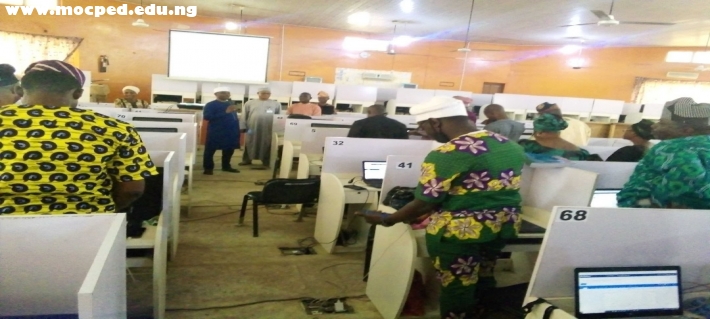

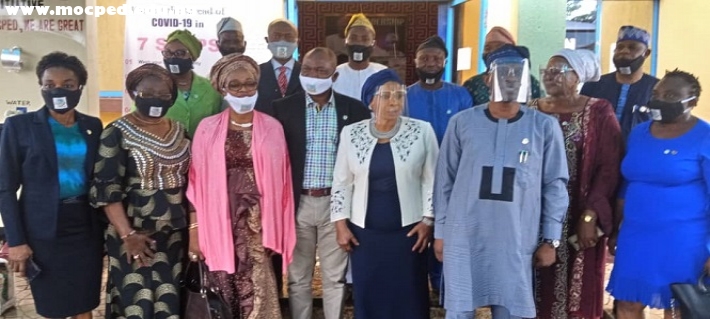

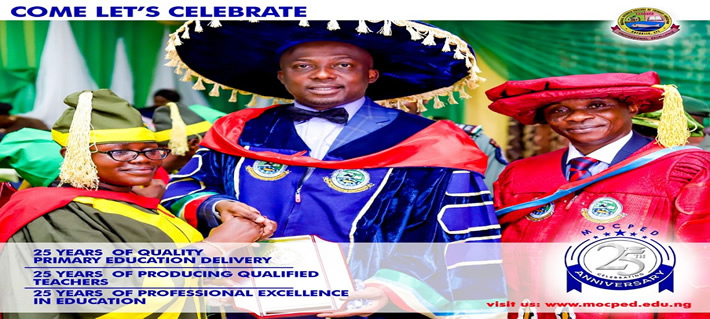
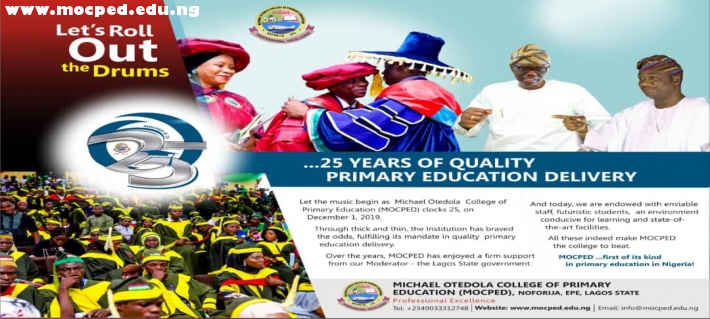
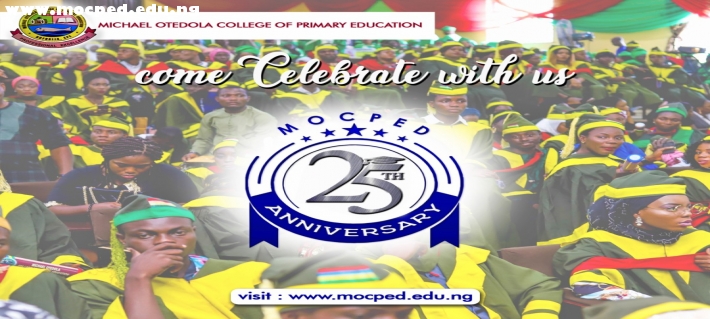
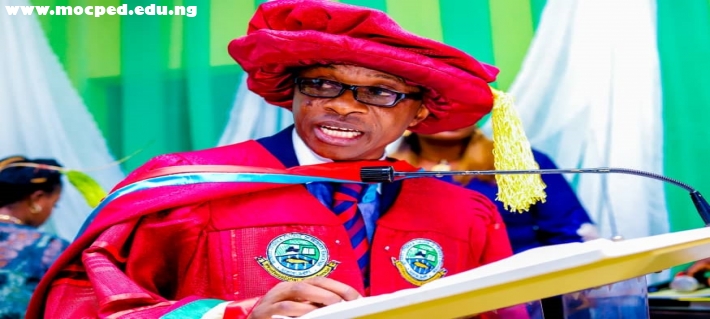
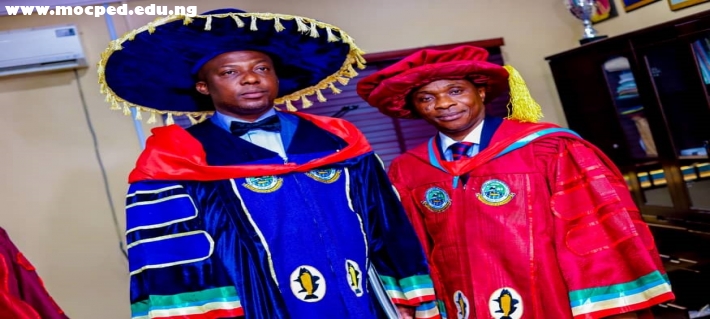
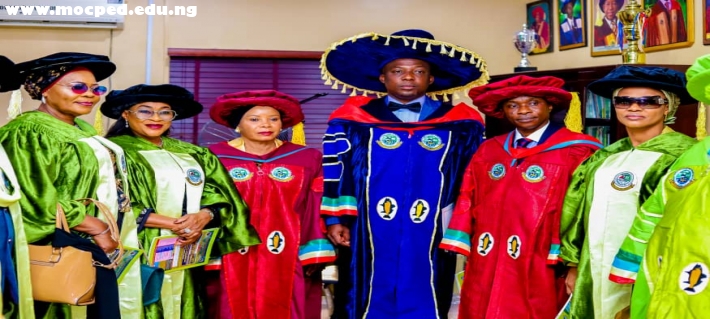





 Powered by MOCPED ICT TEAM
Powered by MOCPED ICT TEAM